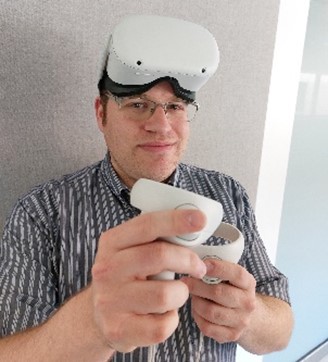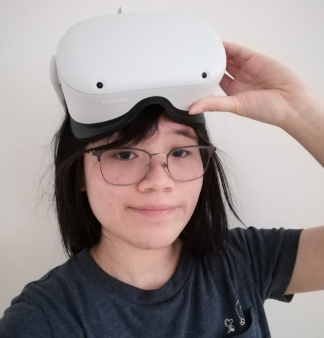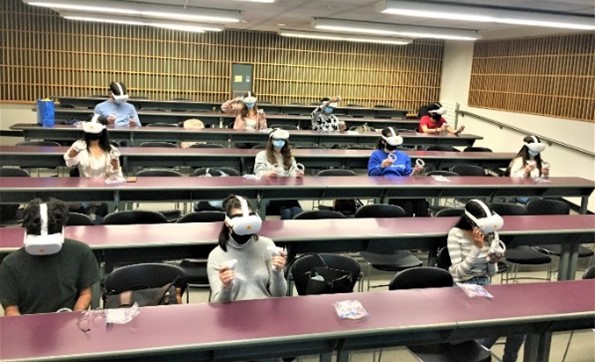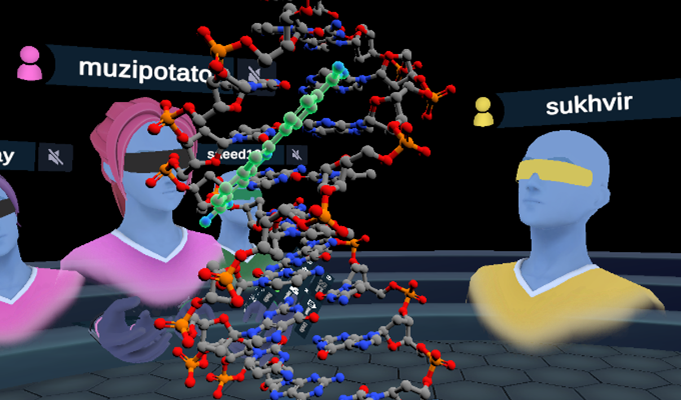Faculty of Science chemistry Professors Kyle Belozerov and Derek Jackson have received new funding to expand the use of virtual reality (VR) technology in chemistry courses to help students understand the structure and function of biological molecules at a deeper level.

The duo are among a group of new enthusiasts at York University to incorporate VR technology into teaching and learning.

Jackson received an Academic Innovation Fund (AIF) Category I grant for the project “Establishing the First Portable VR Learning Facility in the Faculty of Science,” and Belozerov received an eCampus Ontario Virtual Learning Strategy grant for the project “Development of a Suite of Ready-to-use Virtual Reality-Based Interactive Tutorials for Chemistry and Biochemistry Courses.” The professors will serve as collaborators on each other’s grants and will work with other faculty at York University and the University of Toronto to advance these groundbreaking projects.
“VR provides an immersive, interactive learning experience that cannot be achieved using traditional teaching methods,” said Belozerov. “Research shows that students face numerous challenges as they learn complex and dynamic molecular structures using minimally interactive 2D tools like textbook illustrations, videos or computer programs. VR provides a unique opportunity to overcome these limitations.”
“Manipulating molecules in VR feels like holding them in your hands and definitely allows students to develop a deeper and more intuitive appreciation of these structures and their dynamic behavior,” said Casey Yu, an undergraduate biochemistry student who worked with Belozerov and Jackson on VR projects during the summer 2021 semester.

The two grants build on a pilot project launched in Fall 2021 by Belozerov and Jackson that introduced a VR learning component in a third-year biochemistry course (CHEM 3051, Macromolecules of Biochemical Interest). Students in that course had the option of participating in a series of structured exercises using VR headsets equipped with a powerful software for molecular visualization and design supplied by Nanome. Students were asked to load structures into the program and perform a series of measurement and analysis activities. In the first few sessions, students worked mostly independently; but later on, group work and instructor-led interactive sessions were introduced.
“We received overwhelming positive feedback from the students, who were enthusiastic and excited to use the technology,” said Jackson. “We discovered that the VR exercises really enhanced the student learning experience.”
The team had about 15 headsets to work with for their pilot project. With his new AIF grant, Jackson’s team will purchase 35 additional devices and create VR learning activities using the Nanome software for chemistry and biochemistry courses. The team plans to introduce VR exercises in several courses in the Department of Chemistry, and ultimately make the fleet of headsets and educational content available to any instructor in the Faculty of Science to implement in their classroom.
“The availability of ample VR headsets and learning modules will open up opportunities for low-cost, engaging, and immersive learning experiences for our students,” said Jackson.

With his new eCampus Ontario grant, Belozerov’s team will create a series of interactive VR learning modules for chemistry and biochemistry topics that are particularly challenging for student learners. These modules will be available to learners and instructors at any university who have the necessary VR hardware, without any additional cost. These modules will be interactive, whereby a student can pause the recording in VR, and interact with the molecules using a wide range of tools within the Nanome software.

“VR has the potential to reshape learning and experiential education in undergraduate classrooms,” said Belozerov. “We hope that through our work, VR will become more commonplace in science teaching, both at York and at universities across Canada.”


